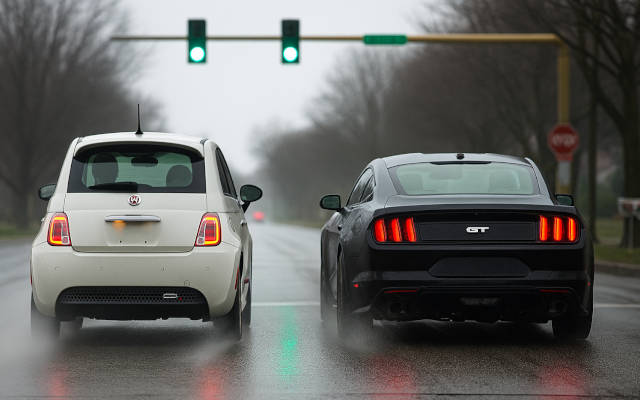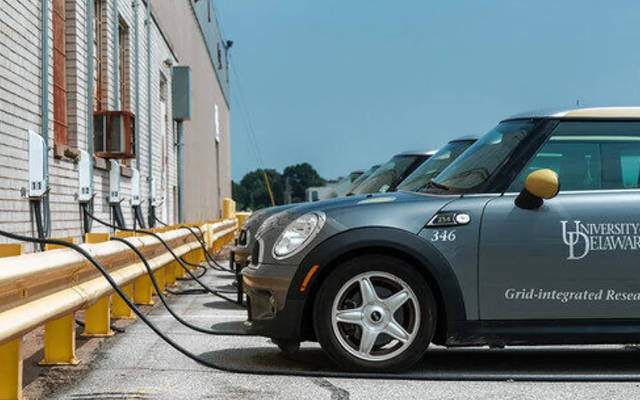 EDITOR'S PICK
EDITOR'S PICK
Stop Babying Your EV: Hard Acceleration Actually Extends Battery Life by 195K Miles
20 Oct 2025 | Synopsis
 A study by Geotab found that electric vehicles (EVs) driven with frequent hard acceleration had battery lifespans extended by up to 195,000 miles. Contrary to common belief, gentle driving may not always benefit EV batteries. The research suggests that consistent, vigorous use helps maintain battery health by keeping cells active and balanced, challenging assumptions about EV driving habits.
A study by Geotab found that electric vehicles (EVs) driven with frequent hard acceleration had battery lifespans extended by up to 195,000 miles. Contrary to common belief, gentle driving may not always benefit EV batteries. The research suggests that consistent, vigorous use helps maintain battery health by keeping cells active and balanced, challenging assumptions about EV driving habits.Bridging The Red-Blue Divide On Climate
18 Oct 2025 | Synopsis
 The commentary by Ken Silverstein argues that bridging the red-blue divide on climate requires listening, finding shared values, and focusing on practical solutions rather than ideology. He highlights how conservative voices like Heather Reams align clean energy with economic growth, innovation and energy independence.
Polls show strong public support for renewables across political lines.
The commentary by Ken Silverstein argues that bridging the red-blue divide on climate requires listening, finding shared values, and focusing on practical solutions rather than ideology. He highlights how conservative voices like Heather Reams align clean energy with economic growth, innovation and energy independence.
Polls show strong public support for renewables across political lines.
E-quipment highlight: Tilmor Super E electric cultivating tractor
18 Oct 2025 | Synopsis
 The Tilmor Super E is a purpose-built electric cultivating tractor made in the USA. It offers quiet, zero-emission operation and a clear view of the work being done. The tractor features a 48V electric system with an expandable battery platform for up to eight hours of runtime. Designed for precision weeding and cultivating, the Super E aims to provide a better farming experience with reduced maintenance and operational costs.
The Tilmor Super E is a purpose-built electric cultivating tractor made in the USA. It offers quiet, zero-emission operation and a clear view of the work being done. The tractor features a 48V electric system with an expandable battery platform for up to eight hours of runtime. Designed for precision weeding and cultivating, the Super E aims to provide a better farming experience with reduced maintenance and operational costs.Letting EVs Take A Load Off The Grid Could Result In 'Negative Emissions' While Saving Drivers Money
17 Oct 2025 | Synopsis
 A Lawrence Berkeley National Lab study finds EVs can reduce grid strain and emissions by charging during low-demand periods and discharging during peak times. This vehicle-to-grid (V2G) strategy could lead to net-negative emissions and save drivers money. Researchers highlight EVs' potential as mobile energy storage, supporting renewables and cutting fossil fuel reliance - all while benefiting both the grid and consumers.
A Lawrence Berkeley National Lab study finds EVs can reduce grid strain and emissions by charging during low-demand periods and discharging during peak times. This vehicle-to-grid (V2G) strategy could lead to net-negative emissions and save drivers money. Researchers highlight EVs' potential as mobile energy storage, supporting renewables and cutting fossil fuel reliance - all while benefiting both the grid and consumers.Elon Musk Is Lying About Tesla's Self-Driving And I Have The DMs To Prove It
17 Oct 2025 | Synopsis
 Electrek's Fred Lambert reveals DMs showing Elon Musk once admitted radar could enhance Tesla’s vision-based self-driving - contradicting his current claims that radar and lidar reduce safety. Despite Musk's push for a camera-only system, rivals like Waymo use sensor fusion and operate rider-only robotaxis. The article argues Tesla's vision-only approach stems from internal limitations, not superior safety.
Electrek's Fred Lambert reveals DMs showing Elon Musk once admitted radar could enhance Tesla’s vision-based self-driving - contradicting his current claims that radar and lidar reduce safety. Despite Musk's push for a camera-only system, rivals like Waymo use sensor fusion and operate rider-only robotaxis. The article argues Tesla's vision-only approach stems from internal limitations, not superior safety.
 EVWorld Exclusive
EVWorld Exclusive
Unlocking Heat's Hidden Potential: How a Nanoscale Discovery Could Transform Everyday Tech
24 Oct 2025 |  A recent nanoscale physics breakthrough reveals heat can transfer across tiny gaps far more efficiently than expected - up to 100 times greater than classical predictions. This could revolutionize cooling and energy systems in electronics, EVs, and smart appliances. While engineering challenges remain, early applications may emerge within 3-5 years, with broader consumer adoption possible in the next decade. The future of heat management may be silent, solid-state, and radically efficient.
A recent nanoscale physics breakthrough reveals heat can transfer across tiny gaps far more efficiently than expected - up to 100 times greater than classical predictions. This could revolutionize cooling and energy systems in electronics, EVs, and smart appliances. While engineering challenges remain, early applications may emerge within 3-5 years, with broader consumer adoption possible in the next decade. The future of heat management may be silent, solid-state, and radically efficient.
Turning the Energy Crunch into a Smart Grid Revolution
24 Oct 2025 |  America's energy crunch is not about supply - it's about coordination. Virtual power plants and vehicle-to-grid systems offer a scalable, software-driven solution to rising demand from AI, EVs, and climate volatility. By turning homes, vehicles, and businesses into active grid assets, and aligning policy with technology, the U.S. can build a smarter, more resilient energy future without building more power plants. The tools exist - now it's time to connect them.
America's energy crunch is not about supply - it's about coordination. Virtual power plants and vehicle-to-grid systems offer a scalable, software-driven solution to rising demand from AI, EVs, and climate volatility. By turning homes, vehicles, and businesses into active grid assets, and aligning policy with technology, the U.S. can build a smarter, more resilient energy future without building more power plants. The tools exist - now it's time to connect them.
Auto Retail in 2025: Bridging the Trust Gap Between Dealers and Buyers
24 Oct 2025 |  The 2025 Urban Science and Harris Poll report reveals a growing disconnect between dealers and buyers. While dealers embrace EVs, AI, and digital tools, many buyers remain cautious - especially about full electrification and online-only retail. Brand loyalty is weakening, and policy clarity is key to adoption. The future of auto retail depends on bridging trust, flexibility, and infrastructure gaps.
The 2025 Urban Science and Harris Poll report reveals a growing disconnect between dealers and buyers. While dealers embrace EVs, AI, and digital tools, many buyers remain cautious - especially about full electrification and online-only retail. Brand loyalty is weakening, and policy clarity is key to adoption. The future of auto retail depends on bridging trust, flexibility, and infrastructure gaps.
Electric Icons in the Making: Audi Concept C vs. Chevrolet Corvette EV
23 Oct 2025 |  Audi's Concept C previews a refined electric GT built on the mature PPE platform, likely arriving by 2026. Chevrolet's Corvette EV promises supercar performance but faces packaging and thermal challenges. Audi is closer to production; Corvette remains in early development. Both reflect divergent strategies in electrifying legacy sports cars, with Audi emphasizing platform maturity and Chevrolet pursuing brand continuity through engineering innovation.
Audi's Concept C previews a refined electric GT built on the mature PPE platform, likely arriving by 2026. Chevrolet's Corvette EV promises supercar performance but faces packaging and thermal challenges. Audi is closer to production; Corvette remains in early development. Both reflect divergent strategies in electrifying legacy sports cars, with Audi emphasizing platform maturity and Chevrolet pursuing brand continuity through engineering innovation.
Electrification Is Not an Oversimplification
23 Oct 2025 |  Despite critiques that the quest for global electrification is "simplistic", the transition is strategic and necessary. Grid upgrades, battery innovation, and tailored policies make electrification viable. Sodium-ion batteries and recycling reduce material risk. Compared to fossil fuels, electrification offers cleaner, safer, and more resilient systems. Complexity demands better design - not delay.
Despite critiques that the quest for global electrification is "simplistic", the transition is strategic and necessary. Grid upgrades, battery innovation, and tailored policies make electrification viable. Sodium-ion batteries and recycling reduce material risk. Compared to fossil fuels, electrification offers cleaner, safer, and more resilient systems. Complexity demands better design - not delay.
 24 Oct 2025 20:59:21 UTC |
RECENT PODCASTS
What Battery Chemistry Wins - Ontario Nuclear Investment - Battery Storage Boom
SEARCH RSSTREAM
 57 New Postings In Past 24 Hours
57 New Postings In Past 24 Hours
Category:mobility
Region:NoAmerica
Date:24 Oct 2025
Category:mobility
Region:NoAmerica
Date:24 Oct 2025
Category:mobility
Region:NoAmerica
Date:24 Oct 2025
Category:mobility
Region:NoAmerica
Date:24 Oct 2025
Category:finance
Region:NoAmerica
Date:24 Oct 2025
Category:mobility
Region:NoAmerica
Date:24 Oct 2025
Category:finance
Region:NoAmerica
Date:24 Oct 2025
Category:finance
Region:NoAmerica
Date:24 Oct 2025
Category:mobility
Region:NoAmerica
Date:24 Oct 2025
Category:mobility
Region:AsiaPacific
Date:24 Oct 2025
Category:mobility
Region:AsiaPacific
Date:24 Oct 2025
Category:mobility
Region:AsiaPacific
Date:24 Oct 2025
Category:finance
Region:NoAmerica
Date:24 Oct 2025
Category:finance
Region:AsiaPacific
Date:24 Oct 2025
Category:mobility
Region:AsiaPacific
Date:24 Oct 2025
Category:energy
Region:IndoAsia
Date:24 Oct 2025
Category:mobility
Region:IndoAsia
Date:24 Oct 2025
Category:review
Region:AustralPacific
Date:24 Oct 2025
Category:mobility
Region:Europe
Date:24 Oct 2025
Category:mobility
Region:NoAmerica
Date:24 Oct 2025